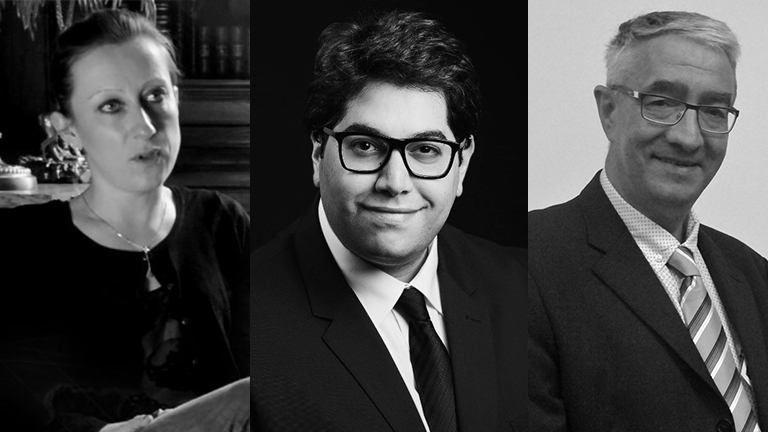At first sight they have little in common: Stéphanie Nuss, Rémy Victorin and Jean Fossiez work in different parts of France and in unrelated sectors. And yet they are all enrolled in the FEDE doctoral school, where they are studying for a Doctorate in Business Administration (DBA). They tell us more.
Stéphanie Nuss
‘The DBA means you are a peer-reviewed expert, so it really adds to your credibility.’
Stéphanie Nuss has been co-director of the Artémys Group since 2009. A member of the FEDE Committee, she is currently reading for a DBA at the FEDE doctoral school.
Tell us about your previous studies.
After a BTS [Brevet de technicien supérieur, a French professional diploma] in Business Studies, I went on to earn a Maîtrise [French four-year degree] in Economic and Social Administration and a DESS [master’s-level degree] in Management. The DBA was the logical next step.
What have been the milestones in your career?
I used to teach economics and law to BTS students at a French business school called Pôle de la fonction commerciale. I subsequently went on to design new bachelor’s-level courses in human resources, marketing and finance. Later one of my colleagues, Phillipe Rennesson, suggested we co-found the Artémy’s Group. We’ve been working together for fourteen years now.
Can you tell us a bit about the Group?
Artémy’s was founded in 2006. It is a SARL [French equivalent of a limited company] based in Metz, Nancy and Forbach.
The Group initially focused on diploma courses within continuing education. Little by little we also began developing consulting services in human resources (all client types).
Today the Group has four main activities:
– Three business and management schools;
– Continuing education (IMCT Training);
– Recruitment (ART RECRUITMENT);
– E-learning (IMCT online).
The Group specialises in training and consulting in human resources; our team includes training managers, HR consultants, work psychologists, careers advisors and teachers. Artémy’s has gradually become an important player in tertiary training in the Lorraine region. Our trademark: all our courses are designed to bridge the gap between education and the job market.
Why did you choose to do a DBA?
I think a great deal about human behaviour in the business context, and the DBA will allow me to explore the subject in more detail. I want to read widely, develop my understanding, formulate new ideas, deepen my knowledge, and write up and share my conclusions. In short, I want both to grow as a person and to pick up my academic studies where I left off. With all this in mind, I have chosen the following overarching research question: in what sense can – and must – the humanities (in general) inform the way we manage businesses?
Really, intellectual challenges are the lifeblood of every domain. Moreover, the DBA means you are a peer-reviewed expert, so it really adds to your credibility. Having a DBA means you are well-equipped to reduce or resolve management issues.
Rémy Victorin
‘The FEDE DBA is a real career booster.’
Tell us about your previous studies.
I graduated from the ING, the Institut National de Gemmologie [National Institute of Gemology], and I also have an MBA in Luxury. So I have a real taste for the world of luxury goods. It’s a sector that has unique management challenges, over and above the usual economic and marketing issues. If you want to understand how it works, you need to adopt a unique approach combining sociology, psychology and philosophy.
Can you describe your career path within the luxury sector?
I’ve been lucky enough to gain international experience across the sector. I initially worked for about ten years in luxury housing in Lebanon – a cosmopolitan country where I worked with an extremely diverse clientele. Later I organised numerous events showcasing luxury items – mostly watches and jewellery – in Switzerland, France, China, Germany and Belgium.
Why did you choose to start a DBA?
For me a doctorate teaches many things: it ensures you stay abreast of ongoing cultural and economic changes on the world scale; it keeps you up to date with increasingly advanced technology; it helps you adapt to the high speed of global information transmission; and it ensures an open attitude to the third millennium.
Given these goals, I settled on the FEDE DBA. You might say I was motivated by three personal passions and that, in addition, the course itself had a specific appeal for me. My passions relate to my subject matter: luxury, marketing and neuroscience. In what way can neuroscience energise and transform the marketing of luxury jewellery? How can this be demonstrated? That’s my thesis question, and I’m passionate about! As for the appeal of the course, I liked the idea of having academic research supervisors: what better way to build expertise than to work with specialists? Finally, the degree is really prestigious. It proves you have a solid knowledge of management in general and of marketing in particular.
What can I say? The FEDE DBA is a real career booster!
Jean Fossiez
‘The FEDE DBA is part of my quest for ongoing development and expresses my readiness to take on increasingly exciting professional and personal challenges.’
Tell us about your previous studies.
I have a French Diplôme d’ingénieur [a five-year ‘engineer’s degree’] in Agriculture from the Institut Supérieur en Agriculture [Higher Agricultural Institute] in Lille. As an engineer, I have always had a critical eye for the practical and concrete aspects of management.
What have been the milestones in your career?
I initially worked in supermarket distribution (from 1986 to 1998). Then, from 1998 onwards, I began a career in education, which I felt was my real vocation. I returned to by initial field – agriculture –, and started out as a teacher at Agroform in Lille (1998-2001). Since 2001 I have been in charge of continuing education at the MFA [Maison familiale et rurale, a French youth and adult training association] in Rollancourt. It was through my work there that I came to hear about the FEDE DBA: we offer the programme to our own students.
Why did you choose to start a DBA?
I’d been thinking about doing a doctorate for a long time, so the FEDE programme really appealed to me. The FEDE DBA is part of my quest for ongoing development and expresses my readiness to take on increasingly exciting professional and personal challenges
If companies/organisations are to thrive in our complex world and in highly competitive professional environments, they need leaders who have interdisciplinary knowledge, the ability to think internationally and the discernment necessary to design systems that will shape the future and adapt to current social trends.
As a doctoral student I want to show that brains are a bonus – for today’s companies and for those of the future. My thesis focuses on finding a new method for exporting France’s famous dairy produce. I have chosen the subject carefully so as to fulfil all the requirements of the DBA.



